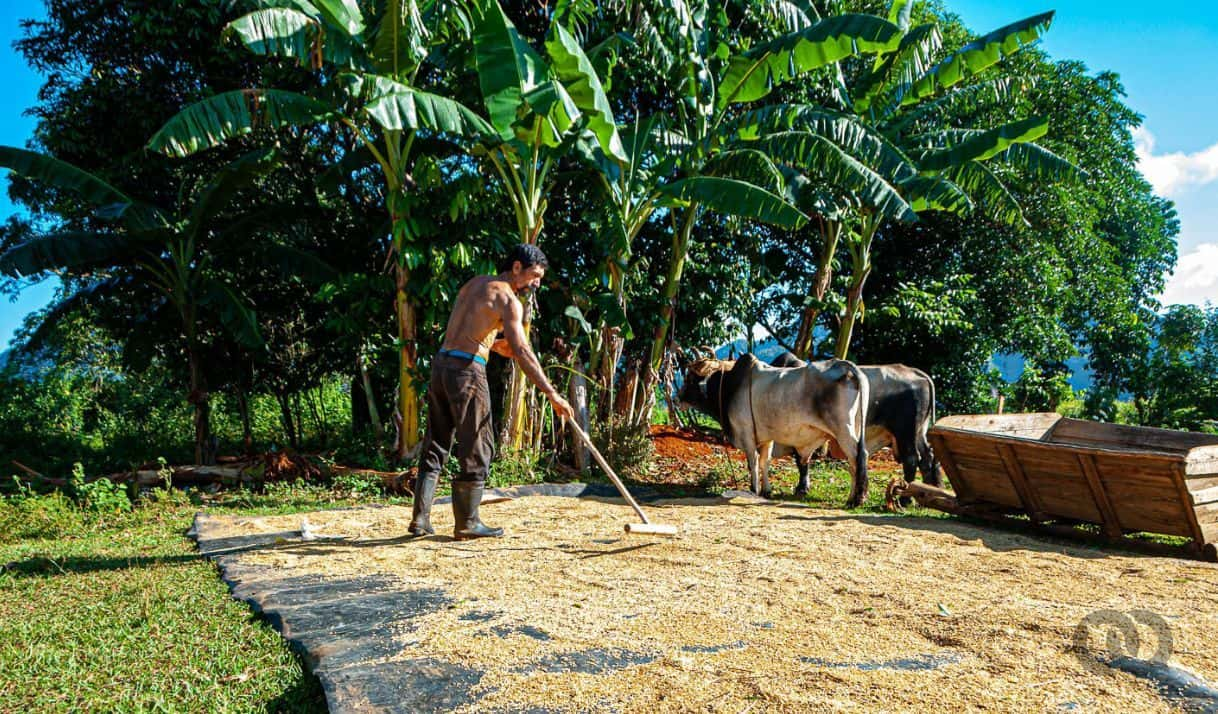In June 2022, Ismael Lorenzo had his pair of oxen stolen from his backyard in the Cumanayagua municipality, in Cienfuegos. It wasn’t until two days later – after filing a complaint and making many phone calls – that the Police arrived on the scene in search of evidence.
“They took two photos and gave me the tirilla (a certificate the Livestock Registry needs to de-register lost animals),” the farmer sums up. He’s understood that, at 70 years old, he doesn’t have the health needed to be on night watch or “walk around under the midday sun” to keep an eye on his cattle in the pasture. He decided to sell the rest of his herd, three cows and a heifer, as a result.
On Sunday February 26th, he only had one cow left, but it was also taken from him between “11 AM and 3 PM.”
Ismael scoured neighboring fields in the following days looking for remains of the animal, while calling the Police regularly to try and get them down to his farm or to at least give him the tirilla to certify the loss of this cow. Resolution 970 “Regulations to Control Larger Animals”, approved in 2016, gives farmers a period of ten calendar days to hand in proof of their complaint if their livestock was stolen or slaughtered illegally. Farmers risk fines of thousands of pesos if they fail to comply with this formality within the timeframe specified.
It took him two days to find the carcass, and another three for the Police to go to his farm, as they allegedly had “car problems.” When they finally visited him, they just noted down some information and gave him the abovementioned certificate.
“Before, the Police would go to the scene of the robbery and take photos, but it seems they got tired of doing that and don’t even do this anymore. People don’t report thefts of crops because they say, “what for?”. They don’t even ask if you suspect anyone. Only livestock theft is reported because it’s compulsory,” the farmer admits.
The only recent case – we have knowledge of – where law enforcement agencies have taken effective action is that of Lazaro Sarduy, an involuntary protagonist and Lorenzo’s cousin. On March 11th, several cattle thieves attacked his house by throwing stones so they could take two horses that still havn’t appeared. The downpour of rocks destroyed a part of the house’s tile roof and a water tank. Lazaro was left stretched out on the floor with a broken skull. He now has a platinum plate in his head.
It was a such a serious incident that police officers from Cruces and Cienfuegos were sent to Cumanayagua. They spread out “like seven dogs”, and they found the criminals’ trail from a bag of stones they’d dumped. They were arrested at a cock fight, while they were spending their booty, Ismael says. “Now, we have to hope the Court doesn’t let them walk free.”
Farmers, ignored and “responsible”
Yordany Diaz, a cattle breeder from Juragua, was murdered in January 2023 by several thieves he caught carving up one of his cows. The crime shook the small community of Abreu, also in Cienfuegos. “The Abreu Police has been informed of many crimes like this on many occasions, and there haven’t been any positive results for cattle breeders, even when we give them all the information they need,” Internet user Alejo Bermudez complained. The small police unit in Juragua was nearly always permanently closed, despite complaints from residents and the growing sense of insecurity.
“I dare to write this to cast a light on my concerns and gather opinions, and to raise awareness somehow among those who can take the measures needed to stop this phenomenon that is hurting our fields and stifling our farmers. We aren’t only talking about livestock theft and the illegal slaughter of cattle and horses, we are talking about farmers who have to keep watch over their fields of beans or corn so they aren’t stolen, over wires of their fences, tobacco in their drying huts, etc., etc.,” Sancti Spiritus native Yurlady Castañeda contemplated.
This isn’t a subject authorities are unaware of. Regular agreements are made on the matter between the National Association of Small Farmers (ANAP) the Ministry of Interior (MININT) and the Ministry of Agriculture (MINAG), an ANAP official said.
“It’s one of the issues that sparks the most differences between our members, to the same extent as prices or supplies, or even more. While farmer watch detachments have increased and the Police has taken action against offenders, things don’t seem to be getting better, unfortunately. High prices of pork and other meats don’t help as livestock theft and illegal slaughter of larger animals has become more “profitable”,” he added.
Instead of tackling this crime wave, farmers are beginning to be blamed for the loss of their livestock. This is what happened to Irbis Merladet’s friend in the Bartolome Maso municipality, in Granma. He was told he’d have to pay a ten-thousand peso fine to deregister a cow that had died from intoxication of stinging nettles. “According to the officials that saw him, this is a measure that is being applied to every livestock owner who reports death or theft,” Merladet explained to El Toque after posting about the case in a farmers’ group on Facebook. Many comments on her post confirmed that similar sanctions had been imposed in provinces such as Havana and Mayabeque.
Operation Tauro deja-vu
In the first two months of 2023 alone, Cuba reported 20,290 incidents of livestock theft and illegal slaughter of larger animals.
A report on Cuban TV indicated that the main causes of this surge in crime were turmoil in livestock production, the absence of rigorous headcounts of animals and the impunity of thieves.
Rising crime rates have been recorded nationwide. Official statistics reveal that there were 12,237 of these cases in Villa Clara in 2022, when there were only 4,071 in 2021.
On the other hand, Sancti Spiritus, the region that accounts for a tenth of Cuba’s livestock production, the number of livestock theft and illegal slaughter cases by the end of September 2022 (2,262) was double the number of similar cases over the same period the year before (1,040).
The most worrying thing is that the surge in crime happened in a year that began with a net decrease of livestock production in the province. Between January 2021 and January 2022, the number of animals dropped by 8,254, for reasons such as excessive “natural” deaths and lower birth rates (only 47% of those expected).
This situation is reminiscent in many ways of the beginning of the previous decade, when MININT launched Operation Tauro, forced by a surge in livestock theft and illegal slaughter of larger animals. Between August 2010 and May 2011 – when the raid began -, 22,728 of these crimes were recorded in Cuba, it was announced later during a Parliamentary session.
Back then, the national livestock population figured at over 4 million cattle; in 2021, the last year with final figures, the number had dropped to just over 3.6 million.
Another alarming fact is that livestock thieves are using firearms. On January 7th, several armed criminals attacked Lazaro Enrique Heredia’s mother’s farm, in Matanzas’ Colon municipality. They took five cows and four horses.
“The thieves are walking free, we know who they are, but the Police says they have to catch them slaughtering the stolen animals, otherwise the Public Prosecutor’s Office lets them go. In recent months, many farmers have gotten tired of these thefts and sold the animals they had left,” he adds.
Matanzas was one of the five provinces that recorded the highest levels of this kind of crime in 2022, when there was a “significant increase [of these crimes] compared to the previous year,” the local Government admitted in January. Formally-speaking, there are 132 farmers’ watch detachments, made up of over 700 farmers, who guard rural areas there and they presented a approximately a thousand complaints in 2022. The Government added that it was necessary to strengthen the farmers’ watch to somewhat cap the surge in crime.
These units were conceived to be a complement to the Police, guaranteeing permanent coverage of rural areas and small communities. However, in reality, a lot of these agricultural areas don’t have public law enforcement agencies present. Like in Juragua, where many police stations remain closed or are used for other purposes. Transferring officers from larger towns is almost always difficult, because of transport shortages.
Tougher sanctions for crimes against larger animals haven’t helped to mitigate the problem. The illegal slaughter of larger animals was added as a crime in the first Penal Code published after the Revolution’s victory, in 1979.
Later, the 1987 Penal Code established prison sentences from two to five years for anyone who slaughters larger animals “without prior authorization from the corresponding state body that is responsible for granting this authorization.” Law 87 from 1999 is an upgrade of this Law after a surge in crimes included in the 1987 Code. Illegal slaughter was also mentioned, and sanctions were now extended to four-ten years in prison.
Meanwhile, seizure of assets was stipulated as a sanction that would need to be imposed on every offender. The new Penal Code in force in Cuba since December 1, 2022, holds onto this framework of sanctions for slaughter (four to ten years), but increased minimum jail time from three to six months for anyone who buys meat knowing that it comes from illegal slaughter.
Punishment is a more sensationalist than effective response to Cuba’s livestock crisis, which not even the government’s much touted 63 measures to recover the farm sector have managed to reverse. One of the most high-profile regulations is the authorization farmers need to slaughter some cows after meeting their sales targets for meat and milk to the State, lost importance a few months after coming into force.
The much-anticipated abundance of beef on the domestic market never came about. It’s a lot more profitable for many livestock farmers to stop giving milk to state-led dairy companies and sell it on the black market in its natural state instead, or as milk and butter. Others have had to reduce their herds because of problems getting supplies and higher theft rates. Cuba’s first Livestock Bill was passed in December and implicitly recognizes the gravity of the crisis, even if it’ll be hard to find solutions via bureaucratic resolutions.
“I won’t keep watch without a weapon,” Ismael commented on Yuraldy’s post. What might initially be seen as cowardice or selfishness, isn’t that at all. As if material problems – payments and climate – weren’t enough, farmers are now facing the challenge of increasing crime rates practically on their own.
This article was translated into English from the original in Spanish.







Comments
We moderate comments on this site. If you want to know more details, read our Privacy Policy
Your email address will not be published. Mandatory fields are marked with *